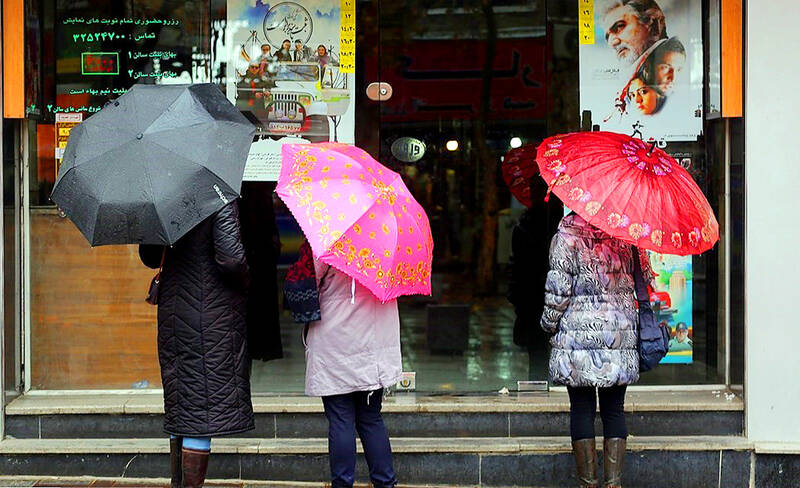對話 Dialogue
清清:唉!臺灣北部的冬天和南部的真不一樣!
Qīngqing: Āi! Táiwān běibù de dōngtiān hé nánbù de zhēn bùyíyàng!

PHOTO COURTESY OF Wikimedia Commons / 照片:Wikimedia Commons 提供
華華:是嗎?怎麼說?
Huáhua: Shìma? Zěnme shuō?
清清:北部相對來說比較冷,氣溫可能會下降到十度左右,甚至更低,所以厚一點的衣服是必需的。南部通常都在二十度以上,穿件薄外套就夠了
Qīngqing: Běibù xiāngduì láishuō bǐjiào lěng, qìwēn kěnéng huì xiàjiàng dào shí dù zuǒyòu, shénzhì gèng dī, suǒyǐ hòu yìdiǎn de yīfú shì bìxū de. Nánbù tōngcháng dōu zài èrshí dù yǐshàng, chuān jiàn báo wàitào jiù gòule.
華華:只有溫度上的差異嗎?
Huáhua: Zhǐyǒu wēndù shàng de chāyì ma?
清清:不是,還有北部的冬天愛下雨,尤其是在山區,南部的冬季比較乾燥。
Qīngqing: Búshì, háiyǒu běibù de dōngtiān ài xiàyǔ, yóutóng shì zài shānqū, nánbù de dōngjì bǐjiào gānzào
華華:原來如此,想不到臺灣這麼小,但北部和南部卻各有特色!
Huáhua: Yuánlái rúcǐ, xiǎngbúdào Táiwān zhème xiǎo, dàn běibù hàn nánbù què gèyǒu tèsè!
清清:是的,所以建議你兩邊都住住看,體驗一下不一樣的感覺!
Qīngqing: Shìde, suǒyǐ jiànyì nǐ liǎngbiān dōu zhùzhùkàn, tǐyàn yíxià bùyíyàng de gǎnjué!
華華:等我下次換工作的時候再說吧!
Huáhua: Děng wǒ xiàcì huàn gōngzuò de shíhou zàishuō ba!
翻譯 Translation
Qingqing: Sigh! The winter in northern Taiwan is really different from the south!
Huahua: Is it? How so?
Qingqing: The north is relatively colder. The temperature can drop to around 10 degrees Celsius or even lower, so wearing thicker clothing is necessary. The south usually stays above 20 degrees, and a light jacket is enough.
Huahua: Is the temperature the only difference?
Qingqing: No, on top of that, it tends to rain in the winter in the north, especially in the mountainous areas, while the southern winter is comparatively dry.
Huahua: I see. I didn’t realize that Taiwan, despite being small, has such distinct weather in the north and south!
Qingqing: That’s right. So, I suggest you try living in both regions to experience the different feelings!
Huahua: I’ll consider that when I change jobs next time!
生詞 Vocabulary
1. 相對來說 (xiāngduì láishuō) relatively, comparatively
2. 氣溫 (qìwēn) (weather) temperature
3. 甚至 (shénzhì) even
4. 厚/薄 (hòu/báo) thick/thin
5. 必需 (bìxū) necessary, required
6. 差異 (chāyì) difference
7. 山區 (shānqū) mountainous area, in the mountain
8. 乾燥 (gānzào) dry, dryness
教材音檔 Audio Files
國立清華大學華語中心提供
By National Tsing Hua University Chinese Language Center:

A Cameroon-flagged cargo vessel “Shunxin-39” was believed to have caused damage to an undersea cable of Taiwan telecoms operator Chunghwa Telecom on the morning of Jan. 3. It was suspected that the Chinese merchant ship, which was registered with the nationality of another country, deliberately cut off the cable by dragging the anchor over it. While the incident is still under investigation, China has a long history of using maritime tactics to sabotage Taiwan’s infrastructure. In February last year, two cables linking Taiwan to its outlying Matsu Islands were damaged within days of each other by a Chinese fishing

Have you ever dreamed of using an entire city as your training ground, effortlessly moving across walls, buildings, stairs, and obstacles? This is not just a fantasy from the movies. In cities around the world, a group of enthusiasts practice this seemingly impossible sport — “parkour.” The origins of parkour can be traced back to 20th-century France. A military officer named Georges-Hebert witnessed the incredible physical abilities of local residents in Africa, which inspired him to create the Methode Naturelle, or natural method. This training method cleverly combined climbing, running, and swimming with artificial barriers to mimic nature. Later, David Belle

A: Who else is on Billboard’s list: “The 25 greatest pop stars of the 21st Century?” B: No. 15 to 6 are: Miley Cyrus, Justin Timberlake, Nicki Minaj, Eminem, Usher, Adele, Ariana Grande, Justin Bieber, Kanye West and Britney Spears. A: I can’t believe that Adele’s only at No. 10. B: No. 5 to 1 are: Lady Gaga, Drake, Rihanna, Taylor Swift and Beyonce. A: Well, they surely deserve the honor. A: 《告示牌》雜誌的「21世紀最偉大的25位流行歌手」,還有誰上榜啊? B: 第15至6名是:麥莉希拉、大賈斯汀、妮姬米娜、阿姆、亞瑟小子、愛黛兒、亞莉安娜、小賈斯汀、肯伊威斯特、小甜甜布蘭妮。 A: 真不敢相信愛黛兒只排第10名。 B: 第5至1名是:女神卡卡、德瑞克、蕾哈娜、泰勒絲、碧昂絲。 A: 這幾位真是實至名歸! (By Eddy Chang, Taipei Times/台北時報張聖恩)

A: The 21st Century is now entering its 25th year. B: So Billboard has released a list: “The 25 greatest pop stars of the 21st Century.” A: Who are the greatest pop singers? B: No. 25 to 16 are: Katy Perry, Ed Sheeran, Bad Bunny, One Direction, Lil Wayne, Bruno Mars, BTS, The Weeknd, Shakira and Jay-Z. A: Wow, my favorite K-pop supergroup BTS has made it to the list. A: 21世紀正在邁入第25個年頭了。 B: 《告示牌》雜誌特別公布:「21世紀最偉大的25位流行歌手」。 A: 最偉大的歌手有哪些? B: 第25至16名是:凱蒂佩芮、紅髮艾德、壞痞兔、1世代、小韋恩、火星人布魯諾、防彈少年團(BTS)、威肯、夏奇拉、Jay-Z。 A: 哇,我最愛的韓流天團BTS也上榜了! (By Eddy Chang, Taipei Times/台北時報張聖恩)